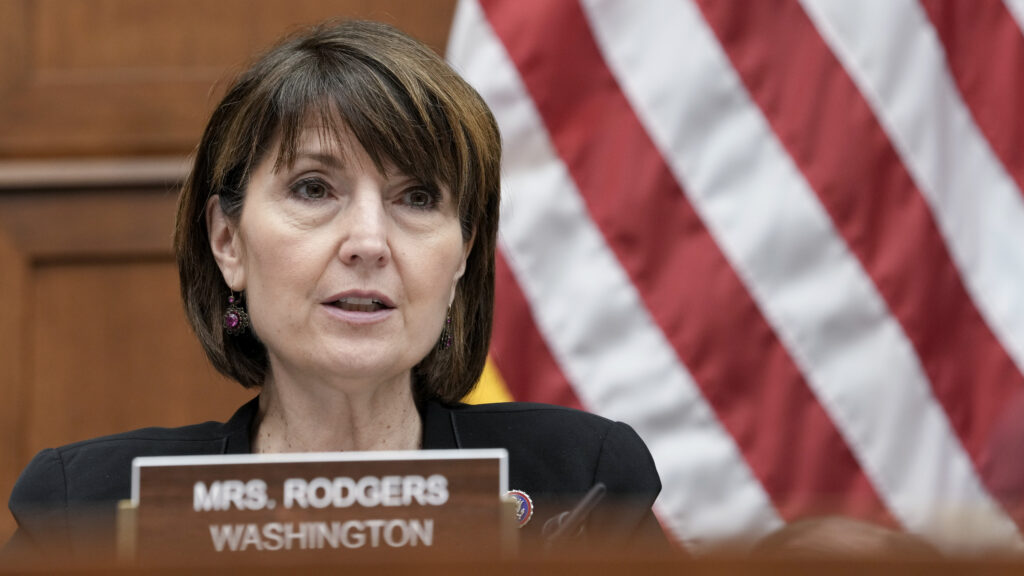WASHINGTON — Republican leaders of a prominent committee overseeing federal health agencies are pushing to crack down on certain viral pathogen research with a new oversight panel.
GOP staff of the House Energy and Commerce Committee recommended in a report Tuesday that the federal government “remove final review and approval” for so-called gain-of-function research from the National Institutes of Health and its infectious disease arm. The authority over these types of studies — which involve making a virus more transmissible or virulent in a lab, and are seen by some as risky — would go to a “wholly independent” entity that would publish reports of its decisions.
advertisement
The oversight board should be “free of conflicts of interest” and “Congress could consider whether Senate confirmation of leadership or members is desirable,” the report stated.
The recommendation came in an interim report based on a monthslong investigation of gain-of-function research conducted by scientists at the National Institute of Allergy and Infectious Diseases. The Trump administration lifted a moratorium on this field of research in 2017, after the Health and Human Services Department issued a framework for researching pathogens with pandemic potential. But the field came under fresh scrutiny during the Covid-19 pandemic and theories about a lab leak of the virus.
“The committee is looking for an issue where there isn’t one. HHS and its divisions, including NIH, follow strict biosafety measures as our scientists work to better understand and protect the public from infectious diseases,” an HHS spokesperson said.
advertisement
It may be difficult to find traction for establishing a new board overseeing certain pathogen research. The November elections are five months away and a number of E&C Committee veterans, including Chair Cathy McMorris Rodgers (R-Wash.), are not seeking reelection. It is unclear who will take up the mantle of NIH research restrictions, particularly if Democrats win the House.
The decision on whether such a board is feasible would ultimately go to the committee’s health subcommittee first, said an E&C aide, speaking on condition of anonymity. “We do need to have additional policy discussions, we need to hear from stakeholders.”
But the report comes amid some lawmakers’ long-simmering frustration with the National Institute of Allergy and Infectious Diseases. A separate panel, the Select Subcommittee on the Coronavirus Pandemic, has probed the agency’s grants for virus research to a nonprofit called EcoHealth Alliance and called for HHS to debar the group, which it did last month. The panel also released emails between a NIAID official and EcoHealth’s leadership about evading federal records requirements, and called retired NIAID Director Anthony Fauci to testify numerous times this year.
The E&C committee is also planning a hearing in “the coming weeks” on Covid-19 and laboratory safety, said a second aide on the panel, who also spoke on condition of anonymity.
E&C Republicans have investigated NIAID’s research protocols for more than a year, zeroing in on efforts by one agency researcher to alter a strain of the mpox virus by inserting genes from a deadlier strain.
NIAID maintains that the researcher, Bernard Moss, never conducted his proposed gain-of-function study and told STAT last year that it was never formally proposed. Committee investigators argue that the NIH’s institutional biosafety committee approved the study in June 2015 and only revoked the clearance last year after the committee began questioning the agency.
“The experiment referenced by the committee was never conducted, which the committee knows. HHS remains committed to ensuring the safety of biomedical research,” the agency spokesperson said.
Moss’ proposal did not technically violate federal gain-of-function regulations, because the ban only pertained to SARS, MERS, and influenza viruses at the time.
GOP investigators also accused HHS, NIH, and NIAID of stonewalling the investigation, though they laid most of the blame on NIAID. The agencies “repeatedly obstructed and misled the Committee,” and their “deception of Congress is unacceptable and potentially criminal,” the report stated.
“The Committee has lost trust in the NIH and NIAID’s ability to oversee its own research on potential pandemic pathogens or enhanced potential pandemic pathogens and to fairly determine whether an experiment poses an unacceptable biosafety or public health risk,” investigators wrote.
“We’re pushing as hard as we can and they are hardly giving us anything,” the second E&C aide said.
They also nodded to recent White House guidance updating the framework for studying these types of pathogens, but concluded that the new guidance is insufficient because the agencies funding these experiments are also charged with regulating them.
“In almost any other scientific field or industry, this arrangement would be immediately recognized as a conflict of interest, necessitating independent review and oversight,” the report stated.

